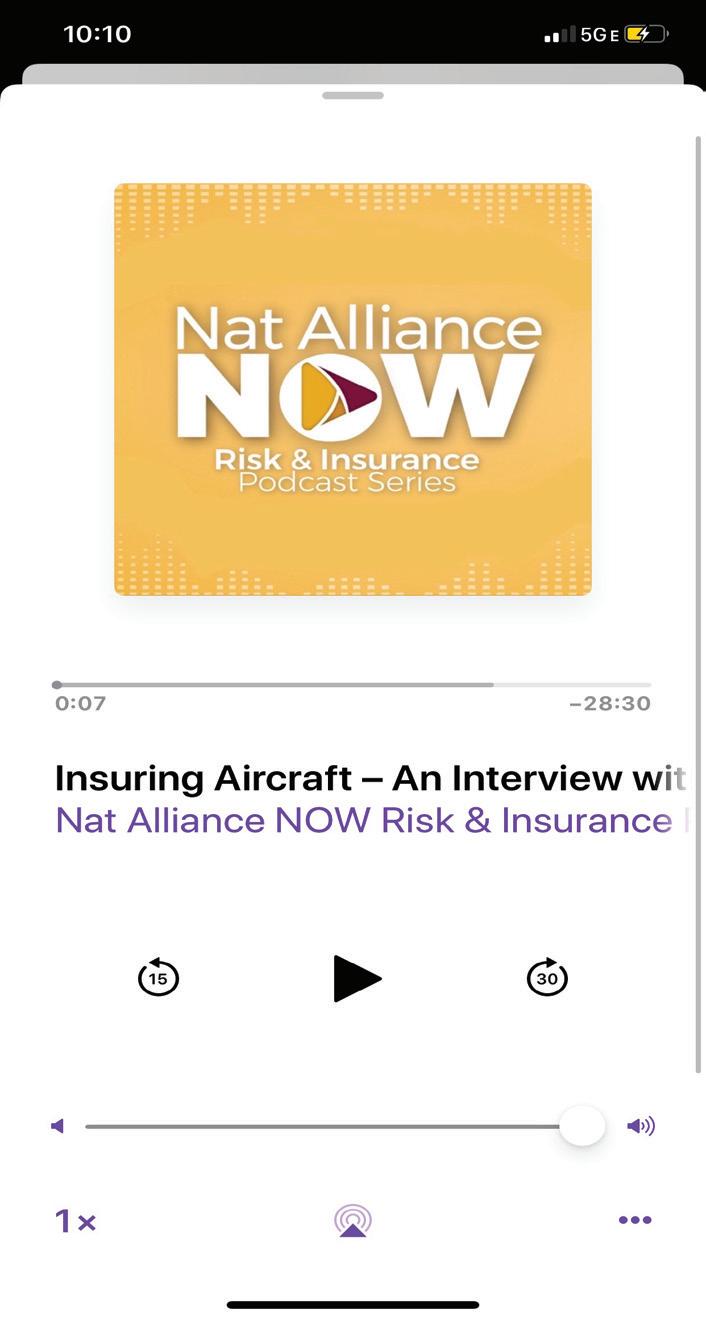
6 minute read
Are you Asking the Right COVID-19 Questions for Your Clients?
e are living in unprecedented times. COVID-19 has disrupted our daily lives worwide. How we work and socialize is now unfamiliar and uncertain.
But the insurance industry can’t directly handle the response or fix what’s happening with the new coronavirus. In fact, insurance is just a piece of the larger risk management process. And prolonged risk management techniques are essential. With that in mind, what should we, as insurance professionals, be talking about?
On the Nat Alliance NOW podcast titled, “COVID-19: A Conversation About Our Current Pandemic,” host Paul Martin, CPCU, sits down with Kyle Drawdy, CIC, CRM, Director of Risk Management at Northeast Florida Education Consortium, and Kelly Surles, CIC, CPRM, CISR, ACSR, personal lines expert at The National W
Alliance, to discuss risk management in the age of the new coronavirus.
Even as insurance professionals seek to inform clients, a handful of risk management solutions are already taking effect. Martin, Drawdy, and Surles share a few that will likely hold more importance as we continue to navigate this pandemic together.
One is avoidance. We’ve already seen entire school systems and universities closing to avoid the spread of the virus among students and teachers. But Drawdy asks about the everyday heroes working on the front lines—those at risk in such places as hospitals, pharmacies, and grocery stores.
The insightful discussion touches on the importance of social distancing; when the crisis will really hit; and what other countries are doing to successfully control the spread—and why it’s working. Hear questions that risk management professionals must ask themselves, and receive practical insight into how you can mitigate the risk in your own daily life at home.
Nearly every business worldwide is innovating and adapting to a new reality. “Now is the time for us, as agents and risk managers, to set ourselves apart and be there for our customers—to be that person on the other end of the line offering support,” Surles says.
And how long will this last? The podcast participants share a few estimates and advice for staying optimistic.
“I can’t think of anywhere in our history where we’ve had so much adversity and challenges put upon us, but I also think that as a country, as individuals, we can come out of this stronger and better for it,” Drawdy says.
As you wrap your head around what’s happening and consider the best risk management approach, make time to listen to this Nat Alliance NOW podcast.
The Nat Alliance NOW Podcast Series
provides risk and insurance professionals with rich, nuanced conversations that deepen learning and ensure the successful completion of National Alliance programs. Monthly episodes feature active industry experts and guest hosts who explore trends and tackle challenging course content.







Listen.Learn. Succeed.






2020 Medicare Advantage Open Enrollment Period
Navigating Medicare & Medicare Suplements




Insuring Aircraft— An Interview With An Expert







Geeking Out With The Insurance Nerds




Retirement: The Risk Of Living Too Long
Q: “What are my online update options?” A: Your career, your choice.
Due to the COVID-19 pandemic, The National Alliance has suspended all classroom programs until further notice. So naturally, one of the most common questions designees have been asking us is, “What online options do I have for my update?” The answer is, literally, “You have dozens of choices!” This is the perfect time to choose an online program for your update. It’s your career, your future, and your success at stake, so we have structured our programs to offer you a vast range of learning opportunities—now with more online options than ever before! The choice you make for your update is yours as you decide on the learning path that will best meet your specific career goals. You always have the option of repeating a class you’ve taken before,* whether to learn the latest developments or further master the knowledge for daily use. You can also start on the path toward your next designation, enhancing your credibility and reputation as a true professional, while opening doors to additional markets and job positions. But, that’s not all—your options also include dozens of advanced online programs. Ruble, PROFocus, and Hold Seminars allow you to dive deeply into specific risk and insurance topics. Update options for CIC, CRM, and CPRM designees are presented in our online instructor-led format. CISR, CISR Elite, and CSRM update options are offered in two formats: online instructor-led and online self-paced. The choices are YOURs. Visit our website TheNationalAlliance.com for full details about all of your update options. As aNational Alliance Designee, you have dozens of online choices for your update, your career path, and your future.
CIC CRM CPRM OnlineInstructor-Led
update options?” A: Your career, your choice.
CISR CISR
ELITE
CSRM
Update Options
Stay Safe–Keep Learning So many great choices! Click on the designation column headers on this spread to link to full listings of topic choices available for your update.
CISR Course
CSRM Course
William T. Hold Seminar
Earn Up to Two Years Update Credit
CIC Course
CRM Course
CPRM Course
James K. Ruble MEGA Seminar
PROFocus Seminar
CE Credit: Refer to scic.com/ce-by-state for information about CE credit hours and requirements in your state. Must Be Dues-Paid
UPDATE ONLINE
Get a Solid Start Remember, we also offer online programs for industry newbies (Introductory Series) and university students (University Associate Programs).







